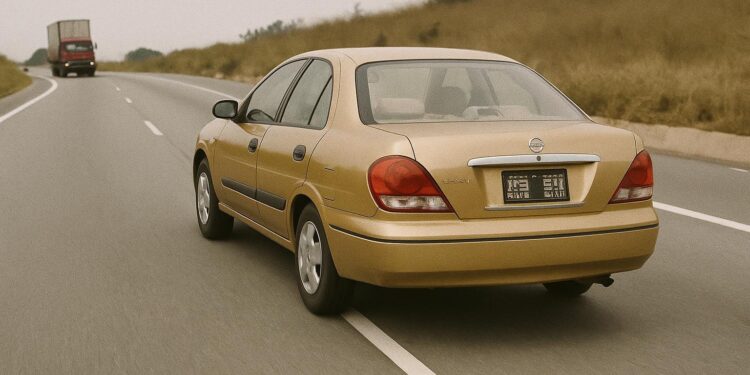Silent Plates, Loud Questions
Brazzaville’s morning traffic offers a striking paradox: gleaming SUVs weaving through taxis, yet some carry no visible licence plates. To residents this silent anomaly has become routine, prompting whispered speculation in cafés and on social media about who drives such cars and why they face few stops.
Local news outlets, including Les Dépêches de Brazzaville, have chronicled the phenomenon for years, but the issue resurfaced sharply after December incidents in Talangaï and Tié-Tié districts where victims reported kidnappings by men in unmarked vehicles (Les Dépêches de Brazzaville, 14 Jan 2024).
Rumours flourish in an information vacuum. Some observers link the cars to well-connected civilians or security units; others see criminal networks exploiting regulatory gaps. The spectrum of theories illustrates both public anxiety and the scarcity of verified data.
National Regulations Under Scrutiny
Congolese traffic law is explicit: article 41 of the 2017 Highway Code requires permanent, legible plates. Vehicle seizure and a fine of up to 200,000 CFA francs accompany non-compliance. On paper, the rule is airtight and aligns with regional norms.
Implementation, however, depends on police checkpoints often overwhelmed by congestion, understaffing and the informal transport sector’s scale. One senior officer, requesting anonymity, acknowledged that patrols “prioritise expired insurance and reckless driving before chasing missing plates”, citing limited resources.
The Ministry of Transport introduced digital plate registration in 2021 to streamline enforcement. The project’s roll-out, managed by Cameroonian contractor SGI, slowed during the pandemic and remains incomplete outside major urban centres (Agence d’Information d’Afrique Centrale, Oct 2023).
Security Shadows on the Boulevards
Kidnappings in unmarked cars dominate headlines because they revive memories of the 1990s urban unrest. Recent cases involve short-distance abductions aimed at mobile-money withdrawals rather than political motives, yet the optics are unsettling for diplomats stationed in the capital.
Police communiqués report nine such incidents nationwide in 2023, down from twelve in 2022, but civic groups argue underreporting persists. Human-rights monitor OCDH notes victims hesitate to file complaints when perpetrators appear well armed or in military fatigues.
Interior Minister Raymond Mboulou told reporters in February that “no unit of the Congolese Armed Forces is authorised to operate unmarked” and promised disciplinary action against any rogue elements, a statement welcomed by foreign missions.
State Countermeasures in Motion
In March, the government launched Operation Plaque Claire, a two-week sweep of major arteries. More than 430 vehicles were impounded and 280 fines issued, according to official figures released on national television.
Authorities coupled enforcement with a public-relations blitz. Billboards in Brazzaville’s Poto-Poto intersection now warn: “No Plate, No Road.” Drivers are offered a 30-day grace period to regularise documents at mobile kiosks funded by the African Development Bank.
Civil-society reactions are mixed. The motorists’ association applauds clearer procedures, while the bar association urges legal safeguards so impoundment does not morph into extortion. Nonetheless, most commentators agree the campaign signals renewed political will.
The Economic and Cultural Dimensions
Some analysts spotlight economic incentives behind plate evasion. Import duties on vehicles, already high, rose last year to shore up post-pandemic revenue. Clearing a used sedan through Pointe-Noire can cost 40 percent of purchase value, nudging owners to delay formal registration.
There is also social cachet. In certain circles, a plate-less SUV conveys influence, hinting at official connections. Anthropologist Serge Ondelé describes it as “a moving badge of status”, complicating purely legal remedies.
Recent music videos by popular artists such as Roga-Roga feature unmarked convoys, normalising the aesthetic for younger audiences. Cultural resonance means that enforcement campaigns must address perception as much as regulation.
Regional Optics and Diplomatic Angles
Neighboring countries monitor the trend closely. In Cameroon and Gabon, unregistered vehicles have facilitated cross-border contraband and wildlife trafficking. Congo’s ports serve as transit points; unchecked cars could undermine regional security frameworks like ECCAS’s Road Safety Charter.
Several embassies in Brazzaville have updated travel advisories, though none discourages essential movement. A European security attaché notes that “the state’s recent clampdown provides reassurance to expatriates, yet consistent follow-through will shape long-term confidence”.
International partners, including the EU and Japan, fund capacity-building for traffic police under the Safer Cities Initiative. These programs frame plate enforcement as part of broader urban-governance reforms, aligning with Congo’s National Development Plan 2022-2026.
Charting the Road Ahead
Experts converge on three priorities: accelerating digital registration, ensuring transparent fines, and fostering a civic culture that prizes compliance. Each requires administrative resolve and public buy-in, not merely sporadic crackdowns.
Tech start-ups are piloting QR-coded windshield stickers that link to a central database, potentially bypassing the cost of metal plates. If successful, the model could scale across Central Africa, branding Congo as an innovator instead of an outlier.
For now, most residents still glance nervously when a dark-tinted car without plates glides past. Whether that reflex fades will depend on the government’s capacity to sustain enforcement and communicate results—a test of both governance and public trust.












































